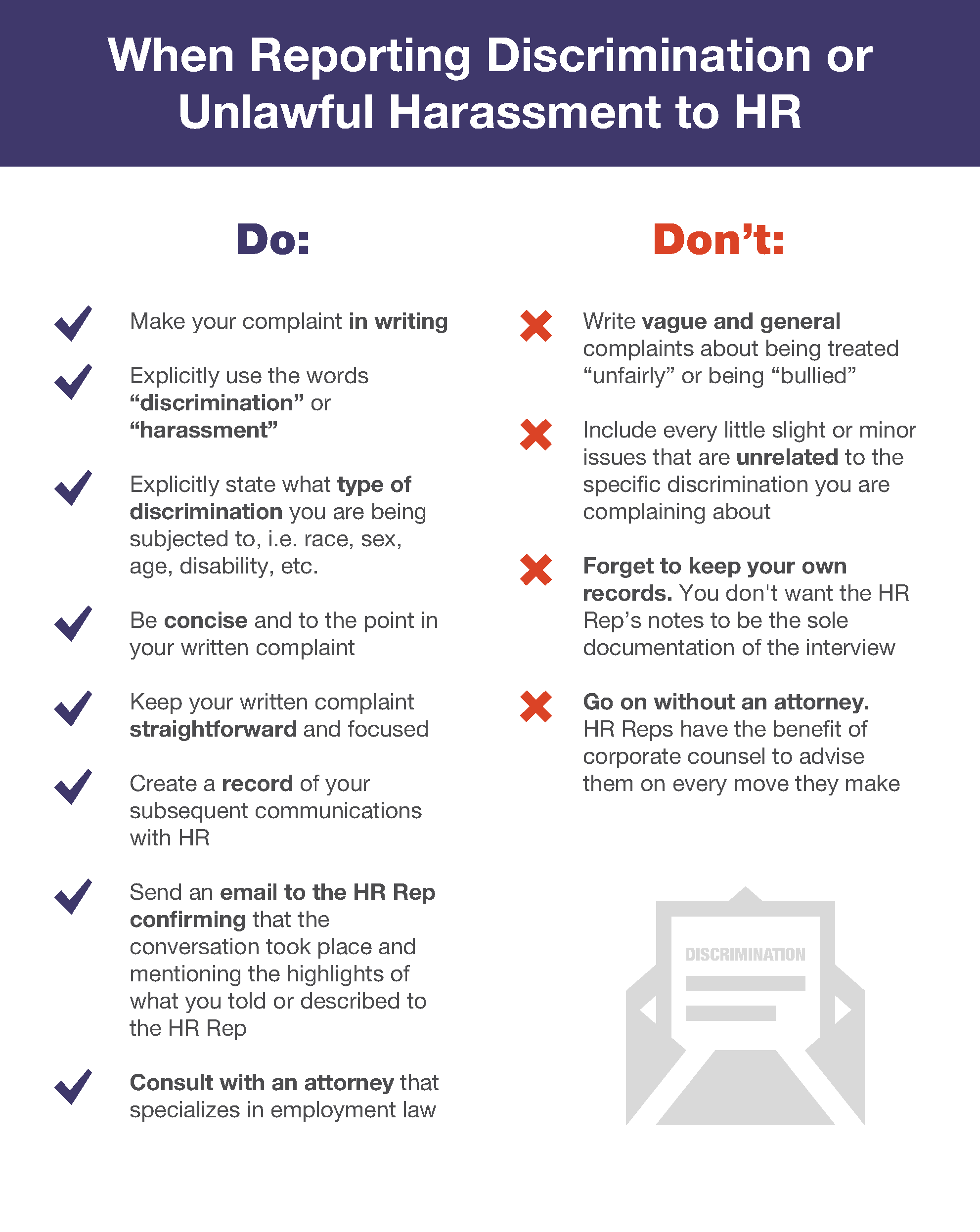
Have you been discriminated against at work? Perhaps a manager or co-worker has discriminated against you . Or, a supervisor has yelled racial epithets at you. Both common sense and your employer’s internal policies dictate that you report this illegal conduct to the Human Resources department immediately. What happens next can have a serious impact on your job and future at the company. It is important to know that how you go about reporting discrimination or harassment in the workplace is critical, and can determine whether you ultimately achieve justice or become a victim.
The truth (and it is a hard truth) is that the Human Resources department is not your friend. You cannot and should not assume the good will of your HR rep. The purpose of the corporate Human Resources department is not to protect you, but to protect the interests and goals of management and the company .
Yes, there will be times when doing the right thing in response to a legitimate report of discrimination and protecting the company will coincide. But all too often, the company will believe that it is in its best interests to ignore your complaint, whitewash your complaint, or even worse, to get rid of you as a “troublemaker.”
Make sure that when you report discrimination or unlawful harassment, you do so in a way that maximizes the legal protections afforded to you and places you in the best possible position if litigation later becomes necessary . Below, we’ll go over some simple do’s and don’ts when it comes to reporting discrimination or unlawful harassment to HR.

You should have evidence and proof that you in fact complained and reported the discriminatory conduct. The best way to do this is to put it in writing and have some type of confirmation that you submitted it. Employees who merely “call” the HR rep and have a verbal conversation alone are at a great disadvantage. What you reported, and even whether you reported anything at all, can then be in dispute.
Make sure to include the following information in your letter to HR. You’ll want to address the person by name, include the date at the top of the letter, and your name, address, and phone number at the bottom. After the salutation, state the following:
Under the law, in order to be protected from retaliation, you must make clear that you are reporting words or conduct that are in violation of state and federal anti-discrimination laws. As such, your letter needs to specifically state that you are being subjected to “discrimination” or “unlawful harassment” on the basis of your race, sex, age, or other protected status.
Vague and general complaints about being treated “unfairly,” being “bullied”, or being subjected to “micro-aggressions” are NOT sufficient. If you don’t explicitly use the words “discrimination” or “unlawful harassment” in your letter, the company may argue that you did not complain of discrimination, and therefore that you have no protection from being terminated for your complaint.
Don’t write an overly long or rambling tome that goes off on tangents and vents on every little slight or on minor issues that are unrelated to the specific discrimination you are complaining about. You want to solidify an impression of seriousness and credibility. You do not want to create an appearance of simply being disgruntled or generally dissatisfied with your overall lot in the company. Keep your written complaint straightforward and focused. Keep your tone matter-of-fact. Do NOT resort to dramatics or emotional appeals.
After you submit a written complaint of discrimination, it is likely that an HR rep will contact you and interview you. The HR rep will take notes of the conversation. However, you don’t want the HR rep’s notes to be the sole documentation of the interview. Usually, the best way to document the conversation is to send an email to the HR rep confirming that the conversation took place and mentioning the highlights of what you told or described to the HR rep.
Your company’s HR reps have access to and the benefit of corporate counsel to advise them on every move they make. There is no reason to go it alone when your job environment and security are at stake. For example, you can have a draft of your written complaint of discrimination reviewed by an attorney before you send it. In some cases, it might be best to have the attorney write and make the complaint directly on your behalf. A few minutes of consultation with an attorney can make all the difference in an important, perhaps life-changing, professional decision.
Zatuchni & Associates (https://goo.gl/maps/TRR34X29VzRCNM3g7) specializes in discrimination claims across all protected categories. We’ve helped countless clients who have suffered workplace bias secure financial and legal compensation from their employers. If you have been discriminated against or harassed at your workplace, contact our experienced employment attorneys online or call 609-697-2204 today for a free consultation. Our attorneys represent New Jersey employees.
Home / Workplace Discrimination / Human Resources: Do’s and Don’ts of Reporting Discrimination or Unlawful Harassment